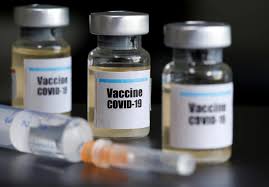Health
FG New COVID -19 Travel Protocol Takes Off Today

...Defaulting Airlines to Pay $3,500 Per Traveller
The COVID-19 protocols, proposed in November 29, 2021, at the height of the deadly virus as guidelines for passengers arriving the country has been revised by the Federal Government.
According to the revised protocols, airlines which fail to comply with the new protocol shall be fined $3,500 per traveler.
Secretary to the Government of the Federation and Chairman, Presidential Steering Committee on COVID, Boss Mustapha, said the new protocol took effect today, Monday, April 4 and would be reviewed after four weeks.
“This protocol is a revision of the Travel Protocol released on 29th November, 2021 Interim Travel Guidelines for Passengers arriving in Nigeria”, Mustapha said.
According to the statement in-bound passengers to Nigeria who are fully vaccinated against COVID-19, are no longer required to carry out COVID-19 PCR test before boarding Nigeria-bound flights.
The SGF stated that fully vaccinated passengers arriving Nigeria will not also be required to carry out Post arrival PCR test or a Rapid Antigen Test upon arriving Nigeria.
The revised protocol further stated that children below the ages of 18 years, would be accorded the same privileges as persons who are fully vaccinated while in-bound passengers who are unvaccinated or partially vaccinated for COVID-19, shall take a COVID-19 PCR test 48 hours, before departure and undergo 2-7 days, post-arrival PCR tests at their own cost.
According to the revised protocol, all in-bound passengers must, register through the online Nigeria International travel portal (NITP https://nitp.ncdc.gov.ng).
Mustapha said out-Bound Guidelines for all the passengers traveling out of Nigeria are expected to be encouraged to have evidence of full vaccination against COVID-19 and must comply with the COVID-19 guidelines of their destination or transit countries.
He added that they must familiarize themselves with the COVID-19 travel requirements of their destination and transit countries before embarking on the journey.
According to the Federal Government, passengers with evidence of full vaccination, the requirement is waved for passengers who are fully vaccinated.
But it further said that the passengers who are not able to show evidence of full vaccination will be treated as unvaccinated and partially vaccinated under the revised protocol.
Full Vaccination for COVID-19 refers to a person who receive doses any of the following COVID-19 vaccines at least Two (2), weeks before date of Travel: Pfizer/ Bio-Ntech, Moderna, Oxford Astra-Zeneca,
Sputnik, Sinopharm, Sinovac, COVAXIN, COVOVAX, Nuvaxovid or single dose of any of the following COVID-19 vaccines:
Jensen (Johnson and Johnson) and Sputnik Light.
It was stated that persons who received a single dose of these vaccines are considered not fully vaccinated.
It was further said that passengers who do not have evidence of full vaccination must perform a COVID-19 PCR test not more than 2 days (48 hours) before boarding.
“PCR tests done more than 48 hours before departure is not valid and persons will not be allowed to board. Rapid antigen or antibody test are not acceptable; only PCR tests can be used for this purpose. Test validity commences from the time of sample collection.
“For travelers with multiple connections before arrival in Nigeria, the PCR test must be valid within 48 hours of boarding from the first point of departure. Travelers must bring along an electronic or hard copy of their negative COVID-19 PCR test for presentation at the departure airport and upon arrival in Nigeria.” The statement reads.
Boss Mustapha said before boarding for Nigeria, travelers must present two documents at their point of departure to be allowed to board and for fully vaccinated passengers, a verifiable full vaccination certificate with a valid security mark will be permitted to travel, with certificate/QR Code.
He stated that for unvaccinated or partially vaccinated passengers, a negative COVID-19 PCR test done within two days (48 hours), must be presented before departure.
“Airlines have been instructed not to board travelers with non-PCR COVID-19 tests (such as antigen or antibody tests), a positive COVID-19 PCR test result, or tests done beyond 48 hours of boarding; and a Paid permit to Travel Certificate/QR Code-Passengers who fail to show a Paid Permit to Travel Certificate/QR Code will not be allowed to board.
He explained that travelers, who are non-Nigerians, would be refused entry into Nigeria and returned to the point of embarkation at cost to the airline.
According to him, travelers who are Nigerians or holders of permanent resident permit would be allowed entry, but subjected to the procedure outlined in Section D below.
” In addition, travelers arriving with forged (fake) vaccine certificate or COVID-19 PCR results shall be prosecuted and required to carry out PCR tests on arrival, on days 2 and 7.
” Airlines shall be fined USD 3,500 per traveler for failure to comply with any of the above mentioned pre-boarding requirements.
“Airlines who consistently fail to comply with the above requirements may be banned from coming to Nigeria; and at the time of boarding, travelers will be required to undergo temperature screening and asked about COVID-19 symptoms.”
Health
UNICEF Promotes Menstrual Hygiene for Girls

The United Nations Children’s Fund (UNICEF) has encouraged girls to embrace menstruation with pride and confidence, recognizing themselves as vital contributors to humanity’s sustainability.
Mrs Aderonke Akinwole, Social and Behavioural Change Specialist at UNICEF, gave the advice during an event on Wednesday organised with the Nigeria Girls’ Guild and Lagos State Primary Health Care Board.
The event was held to commemorate Menstrual Hygiene Day (MHDay) and was attended by students from both public and private schools across Lagos.
With the theme ‘Together for a Period Friendly World,’ the event aimed to raise awareness and promote dignity in menstrual hygiene.
“When a girl begins menstruation, it should be celebrated. It signifies her transition into womanhood and her ability to sustain life.
“They should be proud, and seek accurate, helpful information to remain safe, clean, and healthy during their period,” Akinwole said.
She emphasised that girls must not feel ashamed, as menstruation is a natural part of womanhood and a symbol of female dignity.
She urged the state government to increase sensitisation efforts and include menstrual hygiene education in school curricula, religious settings, and community platforms.
Akinwole also warned against stigmatisation, especially from boys, and called for boys to be educated to respect menstruation as part of girls’ lives.
“Girls should understand the menstrual cycle even before it starts. This should be part of health education in schools, churches, mosques, and communities,” she said.
She explained that girls need awareness on menstrual hygiene management and should know how to prepare for their periods in a healthy, informed way.
Mrs Honfor Adesola, Director of Education at Lagos State Primary Education Board, commended UNICEF’s support in promoting menstrual hygiene and addressing issues affecting girls.
Adesola highlighted that maintaining menstrual hygiene is vital in preventing infections and ensuring comfort throughout the menstrual cycle.
She noted that the event also helped to raise awareness about the Human Papillomavirus (HPV) vaccine available free in health centres across Lagos.
“We’re here to mark MHDay and to engage girls on HPV awareness. The state government has provided the vaccine, and sensitisation must continue,” she explained.
She encouraged girls to discuss the HPV vaccine with their parents to gain consent, ensuring protection against cervical cancer.
“The vaccine is safe, effective, and accessible in state facilities for girls aged nine to fourteen, but many have not yet been vaccinated,” she added.
Meanwhile, Ethagah Divine, Head Girl of New Estate Baptist Secondary School, Surulere, called on NGOs to provide sanitary pads for girls.
She urged more campaigns and rallies to distribute free menstrual products, like UNICEF did, to promote hygiene and dignity during menstruation.
Miss Emmanuella Azubuike, a student of the same school, expressed gratitude to UNICEF and partners for the impactful menstrual hygiene awareness event.
“This programme has expanded my knowledge on menstrual hygiene and HPV. More NGOs should support these campaigns to reach and educate more young girls,” she said. (NAN)
Health
Soludo’s Wife Establishes Pad Banks in 300 schools

Wife of Anambra State Governor, Dr Nonye Soludo, says she has established pad banks in 300 schools across the state as part of her pet project, Healthy Living Initiative.
Mrs Soludo disclosed this in a message in Awka on Wednesday to mark the 2025 World Menstrual Hygiene Day.
She said that the initiative was her own approach to helping school girls whose academic focus could be affected during menstruation and related emergencies.
Mrs Soludo stressed the need to provide immediate solutions for menstrual emergencies in schools, so that girls caught off guard could confidently rely on the pad banks.
“Official data say that an estimated 37 million women and girls in Nigeria are unable to afford sanitary pads and only rely on unhygienic alternatives.
“The data reinforce World Health Organisation and United Nations Children’s Fund finding that poor water, sanitation and hygiene infrastructure hinders safe and dignified menstruation for women and girls.
“Other data say that only two in five schools globally offer menstrual health education and just one in three have bins for menstrual waste.
“These figures challenge key stakeholders to find practical solutions to address the root of the problem while the situation remains reversible.”
She called for intensified campaign to reach more women and girls currently facing menstrual hygiene challenges.
The governor’s wife noted that the growing number of women, especially girls, in urgent need of menstrual support makes it essential for stakeholders to re-strategise their campaign approach.
According to her, menstrual health remains the right of every girl-child.
She encouraged girls at the designated schools participating in the pad bank project to use the supplies with confidence.
Mrs Soludo assured them that her NGO was fully committed to restocking any of the pad banks that run out of sanitary products.(NAN)
General News
More Recognitions, Honor for Ogbodo, Receives Peace Ambassador, Ministerial Award for Outstanding Service

By David Torough, Abuja
Medical Director of Lydia Memorial Hospital in Okpokwu, Benue State, Dr. Mark Ogbodo has once again been honored for his exceptional service to humanity.
This time receiving the prestigious title of Peace Ambassador and a Ministerial Award for the Most Dedicated, Committed and Hardworking Hospital in Benue State.
The honours were bestowed by the National Association of Nigerian Youths Ambassadors for Peace Initiative (NANYAPI) in recognition of Dr.
Ogbodo’s bravery, dedication, and unwavering commitment to medical service delivery in Okpokwu Local Government Area, Benue State, and Nigeria at large.Presenting the award, the President of NANYAPI, Comrade Aji Abraham, described Dr.
Ogbodo as a role model whose leadership and selfless service have distinguished him as a beacon of peace and a symbol of hope. He commended Dr. Ogbodo’s outstanding managerial skills and humanitarian spirit, which he said inspired the association to honour him.The event, held at Lydia Memorial Hospital, drew friends, well-wishers, and dignitaries from various sectors. In a welcome address on behalf of the hospital’s management and staff, Miss Victory Oche expressed heartfelt appreciation for the presence of the association’s leadership and delegates, as well as supporters of Dr. Ogbodo.
“May our purpose of gathering here today, which is to celebrate and honour our mentor and leader, Dr. Mark A. C. Ogbodo, for his unwavering and relentless contributions to humanity and nation building, be fruitful,” she said.
In his acceptance speech, Dr. Ogbodo expressed profound gratitude for the recognition, stating that the award had deeply touched him and would further motivate his advocacy for peace and service to humanity.
“I am deeply humbled and honoured to receive this award,” he said. “It means a lot to me as it acknowledges contributions I never knew were being noticed. This recognition will further spur me to continue promoting peace, unity, and development.”
He urged fellow peace ambassadors to embody the values of integrity, neutrality, and positive engagement. “Tarnish no image. Blackmail no opponent. Build bridges across tribes, cultures, and political divides. Serve as true ambassadors of peace,” he urged.
Dr. Ogbodo pledged continued support for NANYAPI and reaffirmed his commitment to peacebuilding efforts across Nigeria.
The ceremony also featured goodwill messages from traditional leaders, security officers, youth leaders, and the hospital staff, including HRH Chief Mark Barron Onah, Ward Head of Akpodo Community; SP Okoliko, DPO of Ugbokolo Division; Hon. Andrew Ameh, Youth Leader of Amejo Ward; Inspector Ogbaka of Ugbokolo Police Division; and staff of Lydia Memorial Hospital.
































